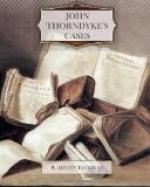“Very well. Now I am going to ask you about another matter. Do you know anyone of the name of Polton?”
“Yes,” replied Gummer, turning a dusky red. “I’ve just found out his real name. I thought he was called Simmons.”
“Tell us what you know about him,” said Anstey, with a mischievous smile.
“Well,” said the boy, with a ferocious scowl at the bland and smiling Polton, “one day he come down to the yacht when the gentlemen had gone ashore. I believe he’d seen ’em go. And he offers me ten shillin’ to let him see all the boots and shoes we’d got on board. I didn’t see no harm, so I turns out the whole lot in the cabin for him to look at. While he was lookin’ at ’em he asks me to fetch a pair of mine from the fo’c’sle, so I fetches ’em. When I come back he was pitchin’ the boots and shoes back into the locker. Then, presently, he nips off, and when he was gone I looked over the shoes, and then I found there was a pair missing. They was an old pair of Mr. Jezzard’s, and what made him nick ’em is more than I can understand.”
“Would you know those shoes if you saw them!”
“Yes, I should,” replied the lad.
“Are these the pair?” Anstey handed the boy a pair of dilapidated canvas shoes, which he seized eagerly.
“Yes, these is the ones what he stole!” he exclaimed.
Anstey took them back from the boy’s reluctant hands, and passed them up to the magistrate’s desk. “I think,” said he, “that if your Worship will compare these shoes with the last pair of moulds, you will have no doubt that these are the shoes which made the footprints from the sea to Sundersley Gap and back again.”
The magistrates together compared the shoes and the moulds amidst a breathless silence. At length the chairman laid them down on the desk.
“It is impossible to doubt it,” said he. “The broken heel and the tear in the rubber sole, with the remains of the chequered pattern, make the identity practically certain.”
As the chairman made this statement I involuntarily glanced round to the place where Jezzard was sitting. But he was not there; neither he, nor Pitford, nor Leach. Taking advantage of the preoccupation of the Court, they had quietly slipped out of the door. But I was not the only person who had noted their absence. The inspector and the sergeant were already in earnest consultation, and a minute later they, too, hurriedly departed.
The proceedings now speedily came to an end. After a brief discussion with his brother-magistrates, the chairman addressed the Court.
“The remarkable and I may say startling evidence, which has been heard in this court to-day, if it has not fixed the guilt of this crime on any individual, has, at any rate, made it clear to our satisfaction that the prisoner is not the guilty person, and he is accordingly discharged. Mr. Draper, I have great pleasure in informing you that you are at liberty to leave the court, and that you do so entirely clear of all suspicion; and I congratulate you very heartily on the skill and ingenuity of your legal advisers, but for which the decision of the Court would, I am afraid, have been very different.”




